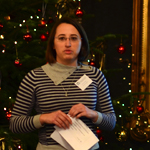Euroacademia Conferences
 Europe Inside-Out: Europe and Europeanness Exposed to Plural Observers (9th Edition) April 24 - 25, 2020
Europe Inside-Out: Europe and Europeanness Exposed to Plural Observers (9th Edition) April 24 - 25, 2020 Identities and Identifications: Politicized Uses of Collective Identities (9th Edition) June 12 - 13, 2020
Identities and Identifications: Politicized Uses of Collective Identities (9th Edition) June 12 - 13, 2020 8th Forum of Critical Studies: Asking Big Questions Again January 24 - 25, 2020
8th Forum of Critical Studies: Asking Big Questions Again January 24 - 25, 2020 Re-Inventing Eastern Europe (7th Edition) December 13 - 14, 2019
Re-Inventing Eastern Europe (7th Edition) December 13 - 14, 2019 The European Union and the Politicization of Europe (8th Edition) October 25 - 26, 2019
The European Union and the Politicization of Europe (8th Edition) October 25 - 26, 2019 Identities and Identifications: Politicized Uses of Collective Identities (8th Edition) June 28 - 29, 2019
Identities and Identifications: Politicized Uses of Collective Identities (8th Edition) June 28 - 29, 2019 The European Union and the Politicization of Europe (7th Edition) January 25 - 26, 2019
The European Union and the Politicization of Europe (7th Edition) January 25 - 26, 2019 7th Forum of Critical Studies: Asking Big Questions Again November 23 - 24, 2018
7th Forum of Critical Studies: Asking Big Questions Again November 23 - 24, 2018 Europe Inside-Out: Europe and Europeanness Exposed to Plural Observers (8th Edition) September 28 - 30, 2018
Europe Inside-Out: Europe and Europeanness Exposed to Plural Observers (8th Edition) September 28 - 30, 2018 Identities and Identifications: Politicized Uses of Collective Identities (7th Edition) June 14 - 15, 2018
Identities and Identifications: Politicized Uses of Collective Identities (7th Edition) June 14 - 15, 2018
European Parliament and Its Administration: What Do We Know and Where Do We Go Next?
-
-

-
Presentation speakers
- Andreja Pegan , University of Luxembourg
- Download presentation
Abstract:
What would be a parliament without its administration? This is the question we look at in this paper. More specifically we deal with the second biggest assembly in Europe, i.e. European Parliament. The scope of the study is restricted to officials working in committee secretariats within the Secretariat and officials working in political groups of the European Parliament. By looking into literature on the Congress of the United States, we propose a mixed-methods investigation on the roles and attitudes of officials in the policymaking process. From the available literature on the administration in the European Parliament, partisanship arises as significant variable shaping life in assembly under study. The purpose of the paper is twofold. Firstly, we demonstrate that studying legislative staff in the European Parliament is worthwhile. Secondly, we propose a methodological way to investigate it. The need for this research is further emphasized by the lack of empirically driven research on the topic. -
Related Presentations

Delayed EU Enlargement in the Western Balkans
- Blerim Reka

Collaboration, Cultural Diplomacy and Conflicting Representations in Contemporary Art Biennials
- Federica Martini Schellenberg
















